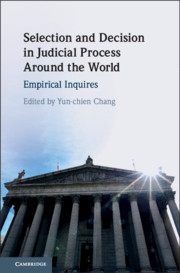Book contents
- Selection and Decision in Judicial Process around the World
- Selection and Decision in Judicial Process around the World
- Copyright page
- Dedication
- Contents
- List of Figures
- List of Tables
- List of Contributors
- Acknowledgments
- Introduction
- 1 Do Patent Law Suits Target Invalid Patents?
- 2 Platform Procedure
- 3 Speedy Adjudication in Hard Cases and Low Settlement Rates in Easy Cases
- 4 How Lower Courts Respond to a Change in a Legal Rule
- 5 Career Judge System and Court Decision Biases
- 6 Judges Avoid Ex Post but Not Ex Ante Inefficiency
- 7 When Winning Is Not Enough
- 8 The Evolution of Case Influence in Modern Consumer Standard Form Contracts
- 9 Judging Insurance Antidiscrimination Law
- 10 Are Judges Harsher with Repeat Offenders?
- 11 Does Efficiency Trump Legality?
- Index
- References
3 - Speedy Adjudication in Hard Cases and Low Settlement Rates in Easy Cases
An Empirical Analysis of Taiwanese Courts with Comparison to US Federal Courts
Published online by Cambridge University Press: 04 December 2019
- Selection and Decision in Judicial Process around the World
- Selection and Decision in Judicial Process around the World
- Copyright page
- Dedication
- Contents
- List of Figures
- List of Tables
- List of Contributors
- Acknowledgments
- Introduction
- 1 Do Patent Law Suits Target Invalid Patents?
- 2 Platform Procedure
- 3 Speedy Adjudication in Hard Cases and Low Settlement Rates in Easy Cases
- 4 How Lower Courts Respond to a Change in a Legal Rule
- 5 Career Judge System and Court Decision Biases
- 6 Judges Avoid Ex Post but Not Ex Ante Inefficiency
- 7 When Winning Is Not Enough
- 8 The Evolution of Case Influence in Modern Consumer Standard Form Contracts
- 9 Judging Insurance Antidiscrimination Law
- 10 Are Judges Harsher with Repeat Offenders?
- 11 Does Efficiency Trump Legality?
- Index
- References
Summary
This book chapter compares civil litigation in the courts of first and second instances in Taiwan in 2010–2015 with that in U.S. federal courts in 2010–2013. The two judicial systems, as expected, are different in many ways. Settlement rates in Taiwan, even broadly defined, were below 25%; in U.S. federal court, they exceed 70%. In Taiwan, summary judgments were basically non-existent; in U.S. federal court, they represent nearly a third of merits judgments. Rates of appeal in Taiwan are nearly 10 times higher (27% versus 3%) than in the U.S. federal courts. And yet judges in Taiwan, at least those in the court of first instance, handled cases more quickly than their colleagues in the U.S. federal courts—indeed, twice as fast. Yet, the two judicial systems respond similarly when encountering simple debt collection cases. These cases, large in number in both systems, fail to settle as standard theories would predict. Instead, these disputes are frequently resolved through default judgments. This chapter provides cautionary lessons for future empirical comparative civil procedure studies.
Keywords
- Type
- Chapter
- Information
- Selection and Decision in Judicial Process around the WorldEmpirical Inquires, pp. 73 - 109Publisher: Cambridge University PressPrint publication year: 2019
References
- 2
- Cited by

